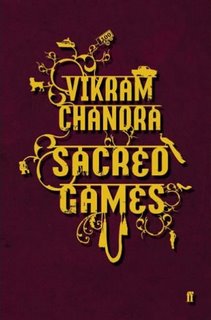
Vikram Chandra has achieved the near-impossible. He has constructed a superbly-realized world of alien languages and customs, mores and styles, presented on the page without apologies or explanations, and has somehow created a wholly believable universe.
That fact that this world actually exists, and is, in fact, modern-day India, makes his achievement all the more astonishing.
Sacred Games represents a quantum leap in the India-born author’s evolution as a writer. His first novel, Red Earth and Pouring Rain, was an alternately hypnotizing and maddening mélange of Indian folk tales and modern tribulations that, for all its excesses, showcased a writer of superb raw talent.
Now, in a fiction cunningly disguised as a straightforward crime drama, Chandra comes into his own, harnessing his narrative powers to reveal an India of “aged-and-cured wickedness,” in all its “piquant scandals, its bitter breakdowns, its ferociously musty unfairness…its resplendent and rotting flesh.” You could call it the unholy love child of Rohinton Mistry and James Ellroy (and you wouldn't be far off), yet Sacred Games is so much more than the bastard descendent of its progenitors.
In a novel of many disparate threads and teeming throngs of secondary characters, there are two personalities that drive the bruised heart of Sacred Games.
The first is Sartaj Singh, a police inspector in Mumbai, investigating the strange death of a local crime lord. Sartaj is a conflicted man, at ease with the strange dichotomy of being a police officer in a land where “the rule of law was an illusion that not even children believed in,” yet troubled by “fragments of the dead” that follow him from every successive crime scene.
The second is the deceased gangster, Ganesh Gaitonde, a charming yet ruthless villain who understands India as a complex world where illiterate farmers “carried mobile phones and murdered their daughters and sons for marrying out of caste.” Chandra leapfrogs through time periods, superimposing the two worlds as a study in striking contrasts and similarities.
Chandra might have been content to simply concentrate on the crime elements, resulting in a lean, bloody entertainment of blackmail, double-crosses, and bullets, but there is a heft and passion at work that elevates the plot from its pulpy origins. The expansive breadth of Sacred Games reveals a truly Dickensian worldview of events and people “randomly tossed about and nudging into each other, splitting each other’s lives apart.”
Like Charles Dickens, Chandra has an unrestrained view of life, revealing truths through both plot and setting. His expletive-laden India is a perfectly-rendered character unto itself, its back-alleys, high-rises, and slums as integral to the story as the streets of London are to Dickens’ masterpieces.
Sacred Games, then, is not so much a crime thriller (although it succeeds brilliantly in that fashion as well), but a rich commentary on a land so plentiful in conflict it is a miracle it doesn’t implode. Chandra clearly loves India for all its many faults, but it is a testament to his strength as an author that the narrative never once becomes sanctimonious or swamped in despair.
As Satraj navigates the punishing terrain of India’s religious strife and class warfare, he imagines that “maybe one day it’ll all just fall apart.” Chandra runs the same risk: Sacred Games, like India, is massive, intimidating, and violent, and, like India, it somehow manages to weave its many elements together, to become something altogether original and special.
Originally printed (expurgated version) in the Winnipeg Free Press, January 14, 2007.

No comments:
Post a Comment